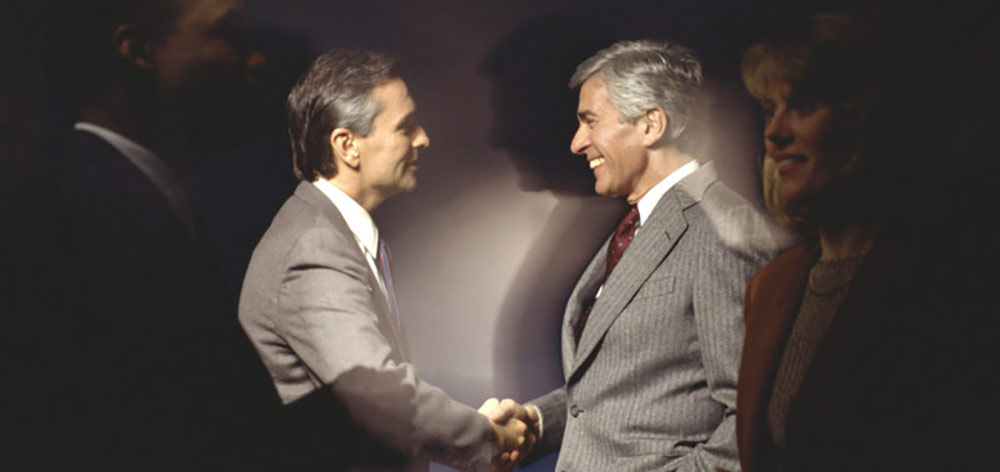“But as for me and my household, we will serve the Lord.” (Joshua 24:15)
In his parting address to the Hebrews, whom he has led for most of his life, Joshua declares the commitment upon which he has lived his life. He will serve the Lord.
Note that his commitment is not just for himself, but for his entire business. “Household” is the Biblical word used to describe everyone in a person’s business – all the family, servants, slaves, and employees who made their living by doing the work that the head, in this case, Joshua, has given them to do. In this passage, Joshua is declaring that he and all the people who make a living in his business will serve the Lord.
The Hebrews to whom he was speaking responded in kind: “We will also serve the Lord, for He is our God.” (vs. 18). The commitment that they made influenced their lives and the lives of the next generation. We read at the end of the chapter, that ”Israel served the Lord all the day of Joshua and all the days of the elders who survived Joshua…” (vs. 31).
Here’s the sequence of events:
- A well-known, well-respected, highly visible person of significance publicly declares that he and all the folks associated with him in his business will follow the Lord.
- The people who hear that commitment respond in kind, following the lead of that significant person.
- They follow through on that commitment.
- The nation is transformed.
What’s the lesson for us?
There is a certain power and attractiveness that accrues to those folks who take a stand and publicly express it. That’s called leadership, and the world is full of people looking for a leader. There is something compelling about a person who is committed to a cause that is bigger than just himself, who has the courage to declare that commitment not only for himself but on behalf of those in his sphere of influence, and to do so publicly for anyone who wants to hear it. The impact can be incalculable — spreading across geographies and dripping down into several generations.
Of course, we’ve all seen this principle in our lives — significant people influencing multitudes with the strength of the commitment to a cause. My mind leaps to Billy Graham on the positive side, and Hitler on the negative. These are grand-scale examples, but there are scores of others in our families and communities who don’t get the same level of notoriety, but for whom the principle is just as operative.
If we want to make this actionable, we just reverse engineer the process. If we want to impact generations of people, we need to make a commitment to a cause larger than ourselves (serving the Lord) and publicly declare that commitment, not only for ourselves but for our entire business. Like a stone thrown into a pool of water, the ripples of impact can spread beyond our ability to discern. It may even be the tipping point to transform a community.
There is so much power in this process that it rises to the level of a fundamental Biblical principle, a promise to us:
32 “Whoever acknowledges me before others, I will also acknowledge before my Father in heaven. 33 But whoever disowns me before others, I will disown before my Father in heaven.” Matthew 10:32, 33
For a Christian business person, the question then becomes, not “if” but “how.” How exactly can you do that? What is the mechanism that would give you a platform for expressing a commitment to acknowledge and serve God?
Is There a Practical Solution?
Our foundational documents – the Vision, Mission, and Values statements we create for our businesses provide an ideal venue for expressing such a commitment. They not only express the deep desires and values of the business owners, but they also bind the employees to that same set of values. While you can’t, in our society, commit someone else – particularly your employees – to following Christ, you certainly can declare your commitment to do so.
In your Vision statement, which articulates the highest aspirations of your business, you can acknowledge the role that God plays in your business.
In your Mission statement, which describes the work that you do and the markets that you serve, you can acknowledge the role of God in that providing that opportunity to you.
In your Values statement, which paints the picture of the ethical boundaries of your business and portrays the higher values to which you aspire, you can develop those out of a deep understanding of Biblical business and Christian ethics.
I’ve attached the foundational documents which I created in 1994 to guide my business. Were I to revise them today, they would look someone different. But they expressed my desire to make a commitment to acknowledge and serve God and to do so in writing, publicly, for all the stakeholders in my business to see, understand and accept. All prospective employees were given a copy, they were posted in prominent places around the office, and were regularly reviewed in company meetings.
If you want to make an impact in your business, if you want to create ripples of impact that could skip across geographies and drip down through generations, then acknowledging God in your foundational statements is a necessary step.
***********************************************************************
The DaCo Corporation
Vision
To continually increase our positive impact on people and organizations while remaining in the center of God’s direction and reflecting His character.
Mission
To help people grow their organizations, their sales, their people, and themselves. We do this through the application of our abilities to provide consulting services, create educational products, create and deliver presentations, and provide training.
Values
Profit: We will earn a better than average profit as this allows us the flexibility to do other things.
Integrity: We will be honest in everything we do, never over-promise, and zealously work to fulfill our commitments.
Value: We will strive to provide our clients with more value than they expect.
Personable: We will be pleasant and easy to work with.
Knowledgeable: Understanding that we are in the business of “selling knowledge,” we will be on the cutting edge of new knowledge.
Open-minded: We will constantly be open to new or different ideas, methods, and concepts from all sources, especially our clients.
Learning: We will value individual and organizational learning (the ability to continually take in new information, acquire new insights, and change in positive ways as a result of that information) as our primary competitive advantage.
Humility: We will constantly be aware that the resources we use and the clients we serve are gifts from God, entrusted to our temporary stewardship.
Quality: In everything we do, we will strive to do it as well as, or better than, the very best companies in the world like ours do it.
**************************************************************
WAS-84: CBI-6



Trackbacks/Pingbacks